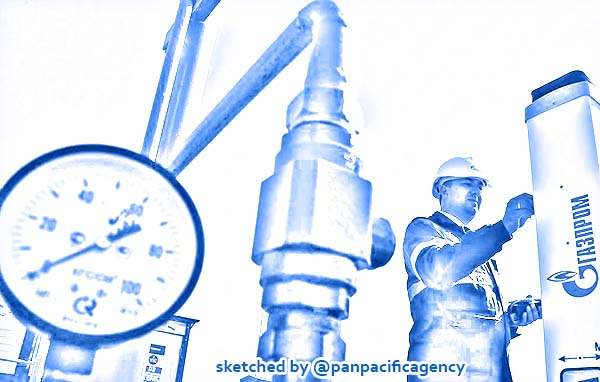‘Nothing will stop’ new EU gas pipeline: Russian diplomat

© Yegor Aleyev/TASS. Sketched by the Pan Pacific Agency.
BRUSSELS, Jun 30, 2020, EU Observer. “Nothing will stop” Nord Stream 2 (NS2), Russia has said on new US sanctions on a pipeline that is seeing the EU side with Russia against its transatlantic ally. “Our view remains the same: nothing will stop the finalisation of NS2. And we leave to Germany and other EU member states to pass judgement on such US measures,” Russia’s ambassador to the EU, Vladimir Chizhov, told EUobserver on Monday (29 June).
The Russian owned firm building the project, the Nord Stream 2 consortium in Switzerland, was equally bullish.
“Our shareholder and the five financial investors are fully committed to the project, as are Nord Stream 2’s suppliers,” it told this website also on Monday, referring to Russian firm Gazprom (its main shareholder) and the EU energy firms co-financing the €10 billion scheme – Engie, OMV, Shell, Uniper, and Wintershall.
They spoke after US congressmen tabled a new bill last week called the Protecting Europe’s Energy Security Clarification Act.
The move would mandate penalties against individuals, such as corporate persons and shareholders, involved in building NS2, according to Alan Riley, a legal expert at US think-tank the Atlantic Council.
“The bill does reach persons who ‘facilitate’ pipe-laying activities,” he said.
It would not enable the US, for instance, to go after German officials who issued permits or mayors of ports where NS2-linked ships had docked, as Berlin claimed last week, he added.
“Arms or emanations of the state are not caught by the [new] sanctions bill,” he said.
“To reach a mayor, it would amount to a facilitation of a facilitation of a facilitation … in other words, this would be too remote,” Riley said.
But the US bill, in any case, prompted a tough response by Germany.
“New sanctions would constitute a serious interference in European energy security and EU sovereignty,” its foreign ministry said last week.
The EU foreign affairs chief Josep Borrell, also took Germany and Russia’s side due to “German pressure”, according to an EU source.
The European Commission was creating an “enhanced sanctions mechanism that will improve Europe’s resilience to the effects of extraterritoriality of [the US] sanctions,” Borrell said last week, replying to an MEPs’ question.
“The EU is fully committed to the protection of … natural persons and legal entities exercising their rights,” Borrell added.
Pipe-laying suspended
The US first imposed sanctions on firms building Nord Stream 2 in December last year.
These forced Swiss firm Allseas, whose ship was laying the final 160km segments of the 2,460km pipe, to stop work.
And the US ambassador to the EU, Ronald Gidwitz, justified America’s actions in remarks last week.
NS2 would increase EU energy dependency on Russia and “it’s very easy to be held hostage when a significant amount of your gas is cut off,” the way Russia cut off Ukraine’s gas in the past, he told press in Brussels.
Asked by EUobserver if he thought NS2 would still be built, he noted: “Well, the Russians are certainly hoping it comes back to life. They’ve got a pipe-laying ship nearby”.
The Russian ship, the Academic Cherskiy, which could take over from Allseas, is currently moored in the German port of Mukran, according to the Reuters news agency.
It is awaiting a new permit from Denmark’s Energy Agency (DEA), in whose waters the last 160-km link lies, because the Academic Cherskiy uses anchors, while the Allseas ship did not.
The DEA also has a pending appeal against its original permit, filed by a Polish NGO, on grounds NS2 construction could disturb World War 2-era chemical munitions on the seabed, endangering wildlife.
The NS2 consortium declined to comment on the Academic Cherskiy. “We will inform about our plans in due time,” it said.
But the Russian firm took for granted that the Danes would not cause problems.
“It [the Polish NGO appeal] has no effect on our ability to construct the pipeline,” the consortium said.
Fanning flames
Technical questions aside, that still left the geopolitics of NS2 as a sore point.
For his part, Borrell warned that it was dividing Western allies.
“The damage inflicted on the EU’s economic interests by US sanctions weakens transatlantic unity and the posture of firmness towards Russia’s actions, jeopardising, and threatening the territorial integrity, sovereignty, and independence of Ukraine since 2014,” he said.
But his reasoning might have sounded weird to NS2’s opponents in the EU, such as Poland and the Nordic states, who say it is Berlin’s cozying up to Moscow that is undermining the EU’s “firmness towards Russia”.
Borrell might also have sounded strange to some German politicians, such as Alexander Lambsdorff, the deputy head of Germany’s liberal Free Democratic Party.
Recalling that Russia, last year, assassinated a Georgian exile in a shooting in broad daylight in a Berlin park, Lambsdorff recently told Bild, a German newspaper, that: “We [Germany] should think three times about whether we should really support such a pipeline”.
Meanwhile, it remains to be seen what kind of “mechanism” the EU commission comes up with.
But the EU’s previous efforts to counter US sanctions, on Iran, using a “special purpose vehicle” for payments did nothing to stop EU firms from fleeing Tehran.
“We can’t stop anybody buying gas from Russia, but we can make it more difficult and we make no bones about it,” Gidwitz, the US ambassador said.
“Rather than fanning the flames of division between the EU and the US, it would be better for Berlin … to work with [the US] on further clarifying this [new sanctions] bill,” Riley, from the Atlantic Council, said.